|
|
|
Sort Order |
|
|
|
Items / Page
|
|
|
|
|
|
|
| Srl | Item |
| 1 |
ID:
113405
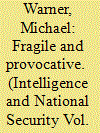

|
|
|
|
|
| Publication |
2012.
|
| Summary/Abstract |
Students of international relations should seek to understand the ways in which power in international relations can be amplified by secrecy. Discussions of 'decision advantage' over rival states have explained information asymmetries and means for competitors to gain advantages by keeping secret their sources of information or the special insights they gain even from information that is widely available. The histories of war, diplomacy and intelligence illuminate such advantages, and also show various ways in which secrecy amplifies 'action' advantages as well as 'information' advantages. That amplification often seems to be accomplished by the same people and organizations, and this essay suggests the prime reason for this common institutional co-location of secret functions can be termed the 'economy of secrecy'. The key to grasping this point is to set aside traditional and academic distinctions between knowledge and action, and information and implementation, when viewing the moves of sovereignties. Sovereign leaders opt to co-locate their secret activities when they judge it too risky (e.g. potentially expensive and dangerous) to distribute secret-information and secret-action functions around too many different offices. The handful of subordinates that receive these functions are what we now call 'intelligence agencies.' Finally, a firmer grasp of the economics of secrecy can improve oversight of secrets and the offices that deal with them.
|
|
|
|
|
|
|
|
|
|
|
|
|
|
|
|
| 2 |
ID:
113401
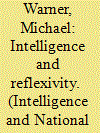

|
|
|
| 3 |
ID:
113407
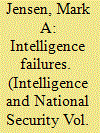

|
|
|
|
|
| Publication |
2012.
|
| Summary/Abstract |
Intelligence failures occur for more reasons than just sloppy tradecraft and are often attributable to decision-makers as well as to the intelligence community. Before exploring the subjective nature of intelligence failures, this article first discusses three foundational concepts underlying them: process vs. product, fact vs. judgment, and prediction. It then outlines major components of intelligence failures: accuracy, surprise, and the role of decision-makers, particularly unrealistic expectations and the use or non-use of intelligence. The article concludes with a discussion of what the intelligence community and decision-makers can do to deal with these three components.
|
|
|
|
|
|
|
|
|
|
|
|
|
|
|
|
| 4 |
ID:
113404
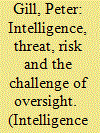

|
|
|
|
|
| Publication |
2012.
|
| Summary/Abstract |
Intelligence studies has traditionally talked in terms of 'threats' though the idea of 'risk' has now entered its language, as it has so many other areas of policy. The key distinction remains the notion of threat of intentional action to cause harm: this is the central preoccupation of intelligence agencies that would not normally consider risks that might arise from, say, the unintended outcomes of accidents or interrupted supplies of resources. Another distinction is that intelligence is normally preoccupied with increasing knowledge in conditions of ignorance or uncertainty, while risk analysis is more likely to be quantifiable. The perception of a 'new terrorism' has led to the importation of the 'precautionary principle' to intelligence with potentially dangerous consequences for democracy. This requires enhanced thinking and practice with respect to the oversight of intelligence activities, especially in developing security networks.
|
|
|
|
|
|
|
|
|
|
|
|
|
|
|
|
| 5 |
ID:
113403


|
|
|
|
|
| Publication |
2012.
|
| Summary/Abstract |
Today, the idea of risk is ubiquitous, a presence in debates across a range of fields, from investment banking to politics, from anthropology and sociology to health, environmental and cultural studies. While this ubiquity attests to the importance of the concept it is at the same time a potential weakness in that it injects the term into a wide range of debates in each of which its meaning can be subject to different emphases and meanings. The notion of risk is of obvious importance to security intelligence, but here too its ubiquity has had an impact on specificity of meaning. While the term is widely used in both the profession and study of intelligence, its usage can carry different meanings and it can be used interchangeably with linked terms. Given the importance of the idea of risk to intelligence, clarity of meaning is essential. This article sets out to consider the meaning of, and relationship between, uncertainty and risk in a security intelligence context, propose a framework on which a common understanding can be built, and illustrate how this can help in thinking about the nature and role of security intelligence.
|
|
|
|
|
|
|
|
|
|
|
|
|
|
|
|
| 6 |
ID:
113408


|
|
|
|
|
| Publication |
2012.
|
| Summary/Abstract |
A representative sampling of 53 treatises onRe militari, diplomacy and theory of state that were published in Europe is analyzed in order to outline the role of secret intelligence in the direction of armies and the government during the sixteenth and seventeenth centuries. The participation of spies, confidants and informers in the exercise of power, whether political, military or economic is a timeless constant, which is not at all anecdotal or marginal. We offer conclusions regarding the formalization of modern intelligence systems based on concepts as closely related as secrets, advice and deception, which configure the precursors of the systematic theory of contemporary intelligence.
|
|
|
|
|
|
|
|
|
|
|
|
|
|
|
|
| 7 |
ID:
113406


|
|
|
|
|
| Publication |
2012.
|
| Summary/Abstract |
The article presents an intelligence case gone bad during the Second World War, when the United States decided to drop a three-man OSS group into Hungary. Hungary, a close ally of Germany, after seeing that the war was not going to end with an Axis victory, wished to seek contact with the Western Allies in order to try to find a way out of its precarious situation. The study, based mainly on archival research, shows the evolution of the Sparrow Mission, whose goals are still unclear today. Both the preparations and the timing of the mission seem to indicate that the plan had some influence on the German decision of occupying Hungary in March 1944, and such a German move helped the Normandy landing of the Allies a few months later.
|
|
|
|
|
|
|
|
|
|
|
|
|
|
|
|
| 8 |
ID:
113409
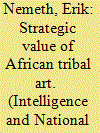

|
|
|
|
|
| Publication |
2012.
|
| Summary/Abstract |
Military engagement of insurgents risks destruction of religious monuments and historic structures, and political and economic instability that follows armed conflict enables looting of antiquities. In combination, threats to cultural structures and movable cultural patrimony compromise cultural security. This article explores the potential of the art market for open-source intelligence assessments of cultural security. A comparison of the market value of artifacts of different ethnic origins provides a measure of the risk of looting of cultural patrimony by geographic region. Intelligence assessments of the relative desirability of cultural artifacts by region of origin can inform strategic planning to mitigate looting in conflict zones and to alert security services to emerging threats of trafficking in cultural patrimony.
|
|
|
|
|
|
|
|
|
|
|
|
|
|
|
|
| 9 |
ID:
113402


|
|
|
|
|
| Publication |
2012.
|
| Summary/Abstract |
Since the events of 9/11 the terms 'threat' and 'risk' have entered the daily lexicon to a greater extent than ever before. News media report on changes to national threat assessments, commenting when the threat level rises from 'Moderate' to 'Substantial', in the case of the United Kingdom. The British government recently released a document that provided details of the issues that pose the highest risk to the national infrastructure. All of these are based, so we are told, on the work of the national intelligence agencies. But what are these indicators actually telling us and what is the relationship between threat assessments and risk assessments? These are both important questions because important decisions are made as a result of changes in these assessments. National defence and security planning is based upon perceived threats and risks. An entire risk management industry has grown up in the business world that covers everything from health and safety to financial risk. It is not only governments and businesses that base decisions on these indicators, but individuals as well. Tourists planning holidays in Europe were alarmed when the British, French and German governments increased their threat levels in response to intelligence that suggested that an attack against tourist sites in their respective capitals was imminent. Some will have changed their plans and travelled elsewhere, to the detriment of the tourist industry, while others will have chosen to defy the terrorists and travel anyway - potentially placing themselves in harm's way. With so much at stake, both nationally and individually, it is therefore important that we understand the difference between a 'threat' and a 'risk' and, as scholars of intelligence, the role that intelligence plays in assessing them.
|
|
|
|
|
|
|
|
|
|
|
|
|
|
|
|
|
|
|
|
|